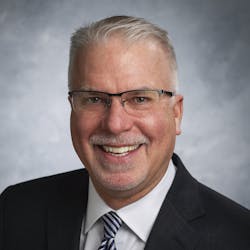On August 26, leaders at the Downers Grove, Illinois- and Milwaukee, Wisconsin-based Advocate Aurora Health posted a press release to the organization’s website announcing breakthrough results on the part of the integrated health system’s three federal accountable care organizations (ACOs.)
As the press release stated, “Data released by the Centers for Medicare & Medicaid Services (CMS) show that Advocate Aurora Health's three affiliated Accountable Care Organizations (ACOs) combined generated the highest savings of any integrated health system in the nation in the 2020 Medicare Shared Savings Program (MSSP). Advocate Aurora generated $110 million in savings, the system’s best performance yet despite the immense challenges of the pandemic. The 2020 effort brings Advocate Aurora’s total savings for the federal government and taxpayers to more than $423 million since joining the program in 2012. The 28-percent improvement over 2020’s total savings came as teams in Illinois and Wisconsin continued to help each other learn and improve in the years after the 2018 merger, providing high-quality, highly coordinated care while managing costs,” the press release stated, adding that “Those results reflect Advocate Aurora’s unwavering commitment to value-based care, lowering costs for patients and other payers while providing the highest quality care possible.
“Last year we established that once we were beyond this pandemic we wanted to be remembered for three things - for taking good care of our team members, our patients and our community,” Advocate Aurora Health CEO Jim Skogsbergh said in a statement contained in the press release. “While the pandemic isn’t over just yet, we continue to pull together, combining the skills of teams in Illinois and Wisconsin and putting our scale to work for our patients. Our results in this program put hard numbers on what we always say is true: We know how to help people live well.”
The press release noted that “Several initiatives across Advocate Aurora's continuum of care contributed to improved patient outcomes and cost savings. Notable wins included:
> Being fully integrated and aligned, putting ambulatory and inpatient care under one leadership structure
> Transition of the Illinois Care Management team to Epic’s Healthy Planet Population Health platform, and full integration with all hospitals on Epic
> Expansion and standardization of clinical education drove efficiencies and improved competency of the team allowing them to serve more patients
> Number of patients served grew by over 5,600 cases across both states
> In 2020, our care management penetration into the MSSP population increased over 10% compared to 2019, touching 10% of the entire MSSP population in IL and almost 13% of the MSSP population in Wisconsin
> Expansion of our Advanced Care at Home Program, which includes Hospital at Home and Palliative Care”
And it quoted Gary Stuck, D.O., the health system’s chief medical officer. “Once again, we have shown ourselves to be a national leader in value-based care,” Chief Medical Officer Dr. Stuck said. “I couldn’t be more proud of our resilient team and their focus on this important work.”
The press release noted that “MSSP ACOs are offered financial incentives to both improve quality and reduce health spending. When an ACO – a group of doctors, hospitals and other providers that form networks to coordinate patient care – demonstrates that it has achieved certain quality and cost reduction benchmarks, it is rewarded with a share in the savings generated for Medicare.”
It also noted that “Advocate Aurora's three ACOs combined received $56 million back from the program, savings that are re-invested in patient care. Advocate Aurora's three affiliated ACOs span both the states it serves, with Advocate Physician Partners Accountable Care, Inc. managing 113,033 Medicare beneficiaries in Illinois and Accountable Care Organization of Aurora, LLC and Aurora Accountable Care Organization, LLC managing 47,871and 23,727 Medicare beneficiaries, respectively, in Wisconsin.”
The Advocate Aurora integrated health system overall encompasses 26 hospitals, 500-plus sites of care, 10,000 physicians, and 75,000 team members, and earned $12 billion in revenues last year. The system was created in 2018 as the result of a merger between two existing systems, Advocate in the Chicago area and northeast Illinois, and Aurora in the Milwaukee area and across the eastern portion of Wisconsin.
Shortly after the announcement of the MSSP results, Dr. Stuck spoke with Healthcare Innovation Editor-in-Chief Mark Hagland regarding the advances that the health system’s ACO leaders have achieved, and his perspectives on the future of the organization’s ACOs and of the ACO phenomenon more generally. Dr. Stuck practiced clinically for 32 years; currently, all his energies are focused on executive leadership in the organization. Below are excerpts from that interview.
How do you account for your organization’s success in the MSSP? It continues to be challenging to achieve success in the program, doesn’t it?
Thanks for recognizing how difficult it is. In the Chicago market, even some great organizations that are very high-quality, didn’t achieve savings. Our focus has always been about improving outcomes while also saving money. We’re very focused on the innovation, and look at it as a learning ground, in terms of how we might expand our success in the MSSP, into work with all our payers? We’re looking to expand that. But I think early innovation—we’ve been doing it a long time—and an intentional focus on investing in our people and our technology. Our scale helps us, because we can do this across a large volume of patients and a large geography.
And part of the success is because we’re on a common electronic health record now, including throughout our employed medical group; that’s Epic. We’ve used that data to support care management teams, through Epic’s Healthy Planet. That’s a powerful care management tool, available to team members across the continuum of care. So we’ve invested in that technology, but also, in our integrated care management program.So we’ve invested in people; and there’s a cost to that. But following patients once they’ve left the hospital. And COVID gave us a little push. We’re using Care Companion, Vital Tech, and Emmi [the Emmi AI patient engagement solution from Wolters Kluwer] that we’re using to reaching out to our patients, to monitor them, in order to prevent unnecessary rehospitalizations and ED visits. And our seniors want to be at home, and want to be cared for at home. If we can give them that, it’s a big satisfier for the patient and the family, and improve outcomes and save money. Integrated care management team uses those tools to reach out to those patients. Emmi leverages phone calls, and also provides educational videos.
Some have compared this work to trying to turn a ship around in mid-ocean. On the one hand, larger, integrated health systems have far more resources than smaller organizations or standalone hospitals. But the politics and bureaucracy can be challenging, correct?
I do think it depends on the organization. But our CEO, Jim Skogsbergh, is serious about improving outcomes and lowering costs for purchasers, payers, and patients. And the fact that we’ve spent millions in technology and on people—we have a proven track record. We’re serious about it. And though it might lower our revenues in the short term, it’s the right thing to do for our patients, payers, and taxpayers. And when you’re looking at things like bundled payments and the MSSP, there’s a learning curve, and it requires an unwavering commitment over time.
And another example of that is that we’ve grown the program. Within the context of our care management program, we’ve touched 10 percent of our MSSP patients in Illinois and 13 percent of our MSSP patients in Wisconsin.
Can you speak to the ongoing challenges in the U.S. healthcare system of changing the physician culture and evolving it forward? It’s physicians who control most healthcare spending, and who need to buy into any systemic changes.
It’s a wonderful question. And you’re right: there’s no question our healthcare spending is out of control, and Medicare funding is in trouble. And the Commonwealth Fund report showing the U.S. ranking eleventh of eleven in quality; it’s embarrassing. The problem is clear and it’s out there. To answer the question, we feel we’re tearing down some of the silos. And we’re aligning financial incentives for physicians. You know, it’s not just doing more, it’s doing the right care in the right place. We’re intentional about reducing duplicative services. And we have programs where we talk with the physicians about state of the art and best practices; and sometimes, it takes a long time to incentivize different behaviors. But doctors feel satisfaction in reducing expenses while delivering improved care, actually.
What have been the biggest challenges in changing the physician culture, and how have you and your colleagues overcome them?
For all of us, we’re still living in two worlds—the fee-for-service world, and the world in which we’re taking on increasing risk under value-based care. You still have some push and pull, and some folks are still anxious about living in both worlds. So it’s education, it’s realigning incentives, and it’s also budgeting with eyes around value-based care.
So many leaders have referred to the one-foot-in-the-boat, one-foot-on-the-shore question; what does that feel like for you on a day-to-day basis?
Well, it’s uncomfortable, but as we continue to see success, in improving outcomes while reducing unnecessary care and costs—with our proven track record, we’ll be a trusted partner for patients’ healthcare.
What does the next couple of years look like for you and for Advocate Aurora Health?
We’ve had our challenges with COVID, and we’re challenged with the surge, with the Delta variant, and with staffing. So there are other challenges that are pressuring all healthcare systems across the country; I see us continuing to expand our care management. We see how effective that is. We’ve done a pretty good job of starting to take care of these chronic conditions, and we need to continue to do a good job of giving optimal care in the right setting.



